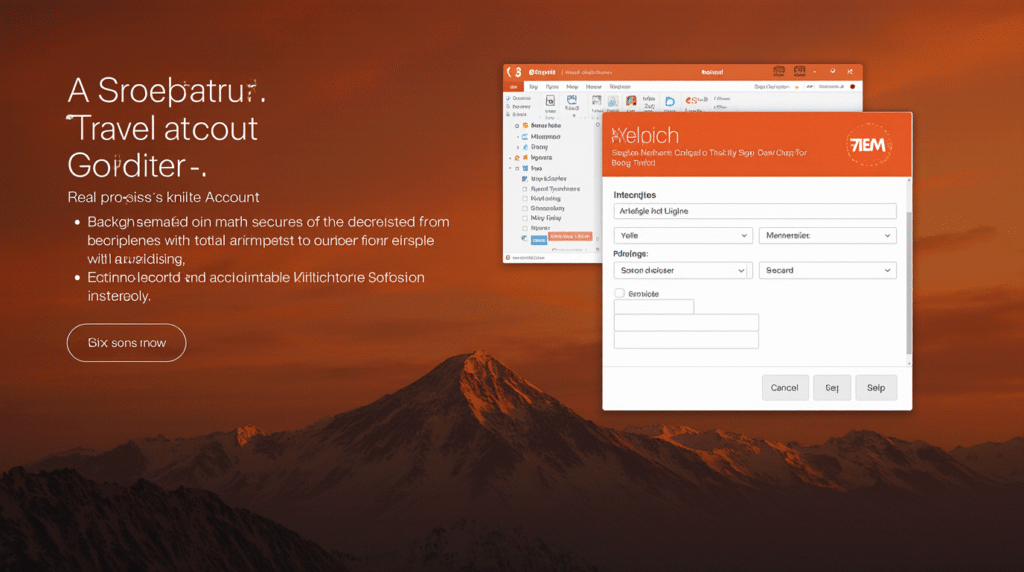Table of Contents
Introduction: Why a Travel Merchant Account Matters

In today’s fast-paced world of global tourism and digital bookings, the ability to process payments securely and efficiently has become a cornerstone for every travel business. Whether you run a small independent travel agency, manage a tour operation, or operate an online booking platform, having a travel merchant account is not just an option — it is a necessity. The travel industry is unique because transactions often involve high-ticket prices, international clients, and cross-border payments. These elements create additional financial risks for banks and payment processors, making travel businesses a higher-risk category compared to traditional merchants.
A travel merchant account allows agencies to process debit and credit card transactions directly from customers. Beyond simple payment acceptance, it ensures that funds are held in a secure and reliable system that protects both businesses and consumers. The travel sector is particularly prone to chargebacks, cancellations, and regulatory scrutiny, so choosing the right provider is crucial. Without a dedicated account, many travel businesses face rejected applications, higher transaction fees, or limited processing options that hurt growth.
This is why platforms like TravelPassion.net emphasize the importance of providing the best reliable and legal service for travelers and agencies alike. By equipping your business with the right financial infrastructure, you not only increase customer trust but also open the door to global markets. In this comprehensive guide, we will explore what a travel merchant account is, how it works, why it is vital for travel agencies, and what features you should look for in a trusted provider.
Understanding Travel Merchant Accounts
What They Are
At its core, a travel merchant account is a specialized type of business account that allows companies in the travel industry to accept credit and debit card payments from customers. Unlike a standard merchant account, this setup is designed specifically for high-risk industries like tourism, hospitality, and travel agencies. The account acts as a holding area for funds from customer payments until they are settled and transferred into the business’s primary bank account.
Because travel-related transactions often involve larger sums, advance bookings, and customers from different countries, banks classify travel merchants as high-risk. For this reason, providers offering these accounts implement additional safeguards such as rolling reserves, stricter underwriting processes, and higher compliance checks. While this may seem daunting, these measures protect both your business and your clients by ensuring that payments are secure and disputes are handled fairly.
In practice, a travel merchant account connects to your payment gateway and point-of-sale systems, enabling you to handle payments in multiple currencies and through various methods. This includes Visa, MasterCard, American Express, and even digital wallets like Apple Pay and Google Pay. By offering this versatility, travel agencies can serve a wider client base and reduce the chances of losing customers due to limited payment options.
How They Work
When a customer books a trip through your agency or website and pays with a card, the payment is routed through the payment gateway linked to your travel merchant account. The issuing bank (the customer’s bank) verifies the transaction, checks for available funds, and confirms authorization. Once approved, the money is placed into the merchant account. After a predetermined settlement period, typically 2–7 days, the funds are transferred to your business account.
This process may sound straightforward, but in reality, travel agencies must contend with complex challenges such as chargebacks, fraud prevention, and fluctuating exchange rates. A strong merchant account provider integrates advanced fraud screening tools, multi-currency support, and transparent reporting dashboards to ensure smooth operations. Many reputable providers also comply with Payment Card Industry Data Security Standards (PCI DSS), ensuring that sensitive financial data is encrypted and safeguarded. You can learn more about PCI compliance at https://www.pcisecuritystandards.org.
For businesses, this means that every booking and every transaction is part of a secure ecosystem designed to minimize risks and maximize reliability. Having such an account demonstrates professionalism and legitimacy, making clients more likely to trust your services.
Why Travel Agencies and Businesses Need a Travel Merchant Account
The travel industry thrives on trust. Customers are entrusting agencies with not only their money but also their dreams of experiencing unforgettable destinations. Without a robust payment infrastructure, travel companies risk damaging their reputation and losing valuable clients. Here are some of the most critical reasons why a travel merchant account is essential for agencies and travel-related businesses:
1. Handling High-Risk Transactions
Travel agencies frequently process large-ticket purchases, often amounting to thousands of dollars per booking. These transactions are susceptible to cancellations, disputes, and chargebacks. Traditional banks view this as risky, which is why many standard merchant accounts deny travel businesses. A specialized account ensures you are accepted and supported despite being classified as high-risk.
2. Global Clientele and Multi-Currency Processing
Tourism is inherently global. A customer from Europe may book a safari in Africa through a U.S.-based agency, paying in euros or dollars. Without a merchant account capable of handling cross-border transactions, businesses would be forced to reject potential clients or pay exorbitant currency conversion fees. A well-designed travel merchant account supports multiple currencies and allows seamless global transactions.
3. Customer Confidence and Legitimacy
Today’s travelers demand convenience and security when making payments. Offering secure card processing and digital wallet support reassures clients that your agency is credible. A lack of reliable payment options can cause customers to abandon their bookings, directly affecting revenue.
4. Integration with Online Booking Platforms
As the travel sector increasingly moves online, integrating with platforms such as booking engines, mobile apps, and reservation systems is critical. A travel merchant account seamlessly connects with these digital platforms, allowing customers to book and pay in one smooth process. This not only enhances user experience but also reduces manual errors in payment handling.
5. Access to Fraud Protection Tools
Fraudulent activities are a constant threat in travel commerce. Cybercriminals often target travel bookings due to their high transaction values. A reliable merchant account provider offers advanced tools such as address verification systems (AVS), 3D Secure, and fraud detection algorithms that minimize the risks of unauthorized transactions.
6. Compliance with International Standards
The travel industry is heavily regulated, and compliance with financial standards is non-negotiable. A trusted merchant account ensures adherence to Know Your Customer (KYC) and anti-money laundering (AML) regulations. By staying compliant, your agency avoids hefty fines and preserves its reputation.
7. Business Growth and Scalability
Finally, having the right account is not just about accepting payments; it is about unlocking growth. With the ability to process larger volumes, attract international clients, and manage risks effectively, agencies can scale confidently. Resources like TravelPassion.net’s corporate travel savings guide highlight how optimizing payment structures can directly improve profitability.
In short, without a travel merchant account, agencies remain limited in scope and vulnerable to disruptions. With it, they gain legitimacy, customer trust, and the ability to compete globally.
How to Apply for a Travel Merchant Account

Applying for a travel merchant account requires preparation, transparency, and patience. Because the travel industry is classified as high-risk, providers conduct detailed underwriting before approving applications. To increase your chances of approval, you need to present your business as professional, stable, and trustworthy.
The first step is choosing the right provider. Begin by researching providers that explicitly work with high-risk industries and have experience in travel. Once you have shortlisted potential partners, gather the documentation they typically require. This includes your business license, incorporation papers, bank statements (often the last three to six months), financial forecasts, tax returns, website URL, and a detailed description of your business model.
Providers will also look at your chargeback history and refund policies. To improve approval odds, ensure your website clearly displays terms and conditions, cancellation policies, and refund procedures. Many agencies also add customer support details and secure SSL certificates to reassure processors and customers alike.
Next, you must complete the application form, which generally asks for details about transaction volumes, average ticket size, countries served, and currencies accepted. Transparency is crucial. If you understate your volumes or hide potential risks, providers may decline your application or terminate your account later when inconsistencies arise.
Once the provider reviews your documents and business model, underwriting begins. This step can take anywhere from a few days to several weeks, depending on the provider. During this time, they may request clarifications or additional paperwork. If approved, you will be offered terms that include transaction fees, reserve requirements, settlement times, and compliance responsibilities.
It’s important to negotiate whenever possible. Many providers are flexible if you demonstrate strong financial management, low chargeback ratios, and solid industry experience. Once you accept the terms, the provider sets up your account and links it to your payment gateway or POS system, allowing you to start processing payments.
For travel agencies serious about long-term success, securing a travel merchant account is more than a transactional step. It represents a commitment to providing customers with secure, legal, and reliable payment solutions — the kind that TravelPassion.net consistently highlights as essential for agencies aiming to change the way people experience travel.
Common Problems and How to Avoid Them
Even with the right account, agencies often face challenges that can jeopardize operations if not handled proactively. Among the most common issues are high chargeback ratios. Excessive chargebacks not only create financial strain but can also cause providers to suspend or terminate accounts. To prevent this, agencies should use clear communication, provide accurate itineraries, and offer responsive customer service. In cases of cancellations, issuing refunds quickly is far better than risking a dispute.
Another problem is unexpected fund holds or frozen accounts. Providers sometimes place rolling reserves or temporary holds on accounts with unusual activity. While this protects against fraud, it can severely affect cash flow. To minimize this risk, keep transaction volumes consistent, inform providers of seasonal spikes, and avoid sudden large increases in ticket sizes.
Currency conversion fees can also erode profit margins. Agencies working with international clients should negotiate for favorable conversion rates or choose providers that specialize in multi-currency processing.
Fraud remains an ongoing threat. Even with advanced tools, determined criminals may still attempt to exploit vulnerabilities. Agencies should adopt multi-layered fraud detection systems, regularly monitor transactions, and educate staff on best practices.
Lastly, regulatory non-compliance is a pitfall to avoid at all costs. Falling behind on PCI DSS compliance or ignoring KYC obligations can result in fines or account closures. Staying proactive with audits, staff training, and third-party compliance services ensures ongoing protection.
By addressing these issues early, agencies create a resilient payment system that strengthens customer trust and allows them to focus on growth rather than damage control.
Outbound Links for Trusted Resources
For agencies looking to expand their knowledge, the following trusted resources provide valuable insights into merchant accounts, compliance, and fraud prevention:
- Visa’s official guide to merchants – insights into card acceptance and fraud tools.
- Mastercard Merchant Resources – guides for secure transactions and global commerce.
- Investopedia Merchant Account Definition – a clear overview of what merchant accounts are.
- PCI Security Standards Council – authoritative resource on PCI DSS compliance.
- U.S. Federal Trade Commission – Travel Scams – useful for understanding risks in the travel payment landscape.
These references strengthen the credibility of your agency and demonstrate to clients that you take security and reliability seriously.
Internal Insights from TravelPassion
To ensure readers get the most from their learning journey, it is also helpful to explore key resources available on TravelPassion.net:
- Best Purse for Traveling to Europe – insights into practical travel accessories.
- Melon Travel – a deep dive into corporate travel solutions.
- Faye Insurance Travel Agent Login – coverage on travel insurance tools for agencies.
- Corporate Travel Savings – strategies for reducing costs with better systems.
- Travel Agency Credit Card Processing – detailed guide on payment solutions for agencies.
Together with the flagship site TravelPassion.net, these resources create a holistic ecosystem of reliable, legal, and life-changing services designed for modern travel agencies.
Frequently Asked Questions (FAQ)

1. What is a travel merchant account and why is it different from a standard account?
A travel merchant account is specifically designed for businesses in the travel sector, which is classified as high-risk due to high transaction values, frequent cancellations, and chargebacks. Unlike standard accounts, they come with additional safeguards such as rolling reserves and stricter compliance requirements.
2. How long does it take to get approved for a travel merchant account?
Approval times vary depending on the provider and the complexity of your application. While some providers may approve within a few days, others may take two to four weeks due to detailed underwriting processes.
3. What documents are needed when applying for a travel merchant account?
You typically need incorporation documents, business licenses, recent bank statements, tax returns, a detailed business model, and your website URL. Providers also require clear refund and cancellation policies to assess your risk profile.
4. How can travel agencies reduce chargebacks?
Agencies can minimize chargebacks by maintaining transparent booking policies, providing accurate itineraries, offering responsive customer service, and issuing timely refunds. Fraud detection tools like 3D Secure also help prevent unauthorized disputes.
5. Are fees higher for travel merchant accounts compared to standard accounts?
Yes, travel merchant accounts generally involve higher transaction fees, rolling reserves, and stricter terms due to the high-risk classification of the industry. However, these costs are offset by the ability to process global transactions securely.
6. Can small travel agencies qualify for a merchant account?
Yes, small agencies can qualify, provided they maintain proper documentation and show financial stability. Some providers specialize in working with smaller, high-risk businesses and offer tailored solutions.
7. Is PCI compliance mandatory for travel agencies?
Yes, PCI DSS compliance is mandatory for any business handling card payments. It ensures that sensitive customer data is encrypted and protected, reducing the risk of breaches and fines.
8. What happens if my account is terminated by the provider?
If your account is terminated, you may be placed on the MATCH list (a blacklist for merchants). This can make it difficult to obtain another account. To avoid this, agencies must manage chargebacks, stay compliant, and maintain open communication with providers.
Conclusion: Choosing the Right Travel Merchant Account

In the competitive and fast-paced world of tourism, the right financial infrastructure can make or break a business. A travel merchant account is not simply a payment solution; it is the backbone of a secure, global, and customer-friendly agency. From managing chargebacks and fraud prevention to ensuring compliance with international regulations, these accounts give travel businesses the tools they need to thrive.
Choosing the right provider requires balancing fees, features, and compliance support. Whether working with global giants like Worldpay, technology-driven solutions like Stripe, or specialized high-risk providers like Skrill, agencies must evaluate their unique needs carefully.
Ultimately, a travel merchant account allows agencies to expand their reach, build customer trust, and create seamless booking experiences. And with resources like TravelPassion.net — the best reliable and legal service considered a top choice that will change your life — agencies can access insights, tools, and strategies that prepare them for long-term success.
